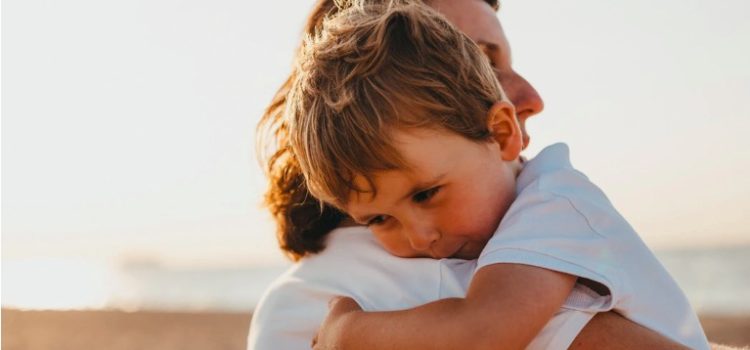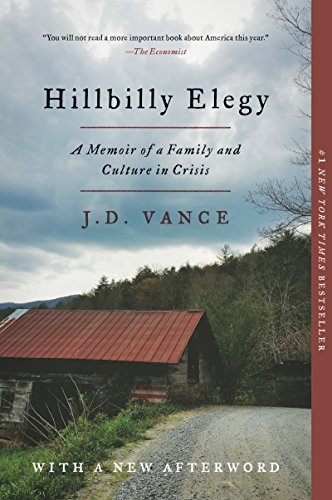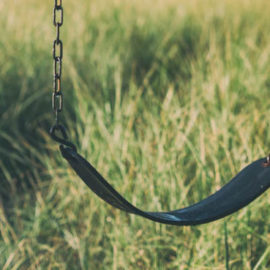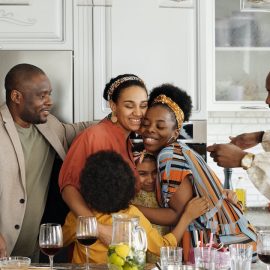

This article is an excerpt from the Shortform summary of "Hillbilly Elegy" by JD Vance. Shortform has the world's best summaries of books you should be reading.
Like this article? Sign up for a free trial here .
What is JD Vance’s family like in Hillbilly Elegy? How do they shape who he becomes, and why does he desire to escape the place where he grew up?
Vance shares the story of his struggles growing up within this culture as a means of articulating a broader social and cultural critique of the Appalachian white working class. Through it all, however, Vance is undeniably proud of where he comes from and clearly loves his family very dearly. We’ll cover the three primary members of JD Vance’s family: Mamaw, Papaw, and Mom.
JD Vance’s Family: Mamaw, Papaw, Mom
He credits his maternal grandmother and grandfather (whom he calls Mamaw and Papaw) with saving him from the dysfunction of his nuclear family and instilling in him the attitudes and work ethic that empowered him to rise above.
Mamaw refused to allow young Vance to succumb to the “woe-is-me” mentality that haunted his community: she encouraged him to work hard, do well in school, and never lower his expectations of himself because of where he came from.
While Mamaw and Papaw were undoubtedly products of the hillbilly culture, they were also self-aware enough to recognize the drawbacks that it could have on a young person’s outlook. They, instead, exemplified the best of hillbilly culture: its pride in America, its patriotism, its grit and toughness, and its fierce sense of loyalty to JD Vance’s family and community. Mamaw and Papaw were extremely influential members of JD Vance’s family.
Thanks to their guidance, JD was able to graduate high school with honors, enlist in the U.S. Marines, matriculate at Ohio State University, and graduate from Yale Law School. Yet Vance is clear that these accomplishments, while extraordinary in the context of the community he came from, are quite ordinary to millions of kids from other parts of the country.
His story shows that the American Dream is not dead, but that the hillbilly culture from which he came is severely inhibiting the white working class from taking advantage of the opportunities that still exist for hard-working, enterprising, risk-taking people.
A History of Violence in JD Vance’s Family
As JD would learn from the recounted stories of his aunt, uncle, and mother, Papaw was an alcoholic, and JD Vance’s family soon became victims of his frightening, drunken outbursts.
Vance recalls hearing about how his mother and aunt would know if they father was coming home drunk or sober based on how he parked his car: if he parked it normally, they knew that there would be a relatively peaceful night at home. But if he parked it erratically or hit a telephone pole as he was pulling in, they knew he was inebriated. This would be their signal to run home to warn their mother about the state their father was in and to flee to neighbors’ house for safety.
Papaw inflicted severe trauma on JD Vance’s family while he was drinking. One Christmas Eve, he threw the family Christmas tree out the door (in full view of the children) when Mamaw failed to produce the freshly cooked dinner he demanded.
Mamaw, though not a drinker herself, was willing to give as good as she got when she retaliated against her husband. One one occasion, she cut his pants with scissors while he was passed out drunk. Other times, she would hide his wallet in the oven. During one fight which Vance’s Uncle Jimmy describes as being particularly violent, Mamaw hurled a glass vase at her husband’s face, splitting his forehead wide open.
Eventually, before JD was born, Mamaw and Papaw separated and he moved out of the house. Despite this, they never formally divorced, and would remain entwined in one another’s lives through the shared ties to their children and grandchildren. They remained integral members of JD Vance’s family.
The Statistics Catch Up to JD Vance’s Family
Despite this war at home, two of the family’s three children managed to escape the cycle of dysfunction and abuse and go on to lead successful productive lives. Uncle Jimmy went to night school and found a sales job with Johnson & Johnson in California, getting out of Appalachia altogether and starting a true professional career (rather than just a wage-earning job).
Aunt Lori (or Aunt Wee, as Vance calls her) managed to recover from an abusive first marriage at the age of sixteen, later establishing a career in radiology and finding a stable, loving partner in her second husband.
Unfortunately, most children who grow up in abusive homes like JD Vance’s family’s emerge with emotional scars. Jimmy and Lori beat the odds—JD’s mother Bev didn’t. Looking back, JD would wryly observe that the statistics on abuse caught up with Mamaw and Papaw’s middle child.
Bev’s subsequent struggles with unstable marriages, substance abuse, and mental illness would come to wreak havoc on her own two children’s lives and leave a permanent stamp on JD’s worldview.
A Childhood of Dysfunction
JD’s mother was a pivotal (and disruptive) member of JD Vance’s family. She had once been a promising student and seemed on track to rise up from the poverty and abuse that had surrounded her as a child. Unfortunately, she fell into the same cycle of dysfunctional that she had learned from her parents. She married her high school boyfriend and quickly found her life beset by the drama, fighting, and violence that had so defined her parents’ marriage.
At nineteen, she gave birth to a child (JD’s older sister Lindsay), filed for divorce, and began life anew as a single mom. After remarrying in 1983, she gave birth to JD in 1984, in Middletown.
The War in JD Vance’s Family
JD’s father was a man named Don Bowman, his mother’s second husband. JD remembers little from his early childhood before the age of six, but he does recall one particularly vivid memory from this period.
One day, his mother picked him up from kindergarten and told him, quite matter-of-factly, that he would never see his biological father again. Bev’s explanation was that his father “didn’t want him anymore” and wanted instead to give him up for adoption. This would be the first in a long series of father-figures who would come and go from JD’s life, a product of his mother’s inability to form stable relationships and her extreme willingness to jump into living arrangements with men she barely knew—a pattern of tumult and instability that would become a constant source of pain and anxiety for JD and Lindsay. This was a normal aspect of JD Vance’s family.
Marital Discord
JD was legally adopted by his mother’s next romantic partner, a man named Bob Hamel. While he treated the children kindly, Bob embodied so much of the hillbilly culture that Mamaw and Papaw had desperately wanted their children and grandchildren to steer clear of.
JD had an early childhood exposure to his mother’s pattern of unstable and unhappy relationships with men. JD was forced to witness frequent screaming matches between his mother and adopted father; physical violence between the couple (with the one stipulation being that Bob couldn’t hit first); and brutal verbal abuse.
There was also a reckless financial profligacy and a total lack of regard for saving and thrift, behavior that JD would come to see as a consistent feature of hillbilly culture. This was despite the fact that the household income exceeded $100,000: hardly a small sum in rural Ohio. Bev and Bob racked up thousands of dollars in credit card debt, spending lavishly on items that they didn’t need, like new cars, new trucks and even a swimming pool. The deteriorating financial situation hastened the demise of this fragile marriage. Bob and Bev separated and another father figure in JD’s life (his legal father in this case) was gone. JD Vance’s family was broken up again.
Mom’s Situation Accelerates
Although her marriage with Bob was loveless and marked by verbal and physical abuse, its deterioration clearly took a powerful emotional toll on her already-fragile and unstable psyche.
Bev began to turn to drugs and alcohol, and started having numerous affairs with strange men who would suddenly appear and then disappear from JD’s life. As a result, JD and his sister grew having no idea of how a man ought to treat his family and without any true father figure at all.
Things came to a head when she tried to kill herself by crashing her car into a telephone pole. When she was released from the hospital, things only deteriorated further. The kids got a full view of the extent of their mother’s dysfunction, as she would stay out all night with new friends that JD and Lindsay had never met before. She would also subject them to extreme emotional outbursts and episodes of physical violence.
Things lingered in this state for a few months, until an event took place between JD and his mother that forever altered their relationship and JD Vance’s family, and showed JD just how toxic his mother had become.
A Watershed Moment
After one of his mother’s characteristic outbursts, she decided to make it up to her son by taking him out to buy some football cards. During the ride to the mall, JD said something to her (he doesn’t recall now what exactly it was that he said) that set off his mom’s trigger-hair temper.
She reacted with a level of fury and violence that even JD, for all he’d seen, could hardly fathom. She accelerated the car and threatened to kill the both of them, then pulled the vehicle over and attempted to savagely beat her son.
JD managed to escape the car and run to a nearby house, where the woman at home called the police. Before the police arrived, Bev had managed to kick down the woman’s door and drag JD, who was screaming for help, onto the front lawn. Bev was ultimately arrested, violently resisting as the cops put her in the squad car.
In the aftermath, JD’s mother would retain nominal custody of the children, but with the tacit agreement that JD could live with Mamaw whenever he wished. JD Vance’s family was torn up, almost irreparably, by this event.
———End of Preview———

Like what you just read? Read the rest of the world's best summary of "Hillbilly Elegy" at Shortform . Learn the book's critical concepts in 20 minutes or less .
Here's what you'll find in our full Hillbilly Elegy summary :
- The hallmarks of hillbilly culture and why they hold people back
- How JD Vance broke out of his hillbilly childhood and graduated from Yale
- Why the author thinks hillbillies might be beyond saving







What an awesome life to live through and continue to further his career.